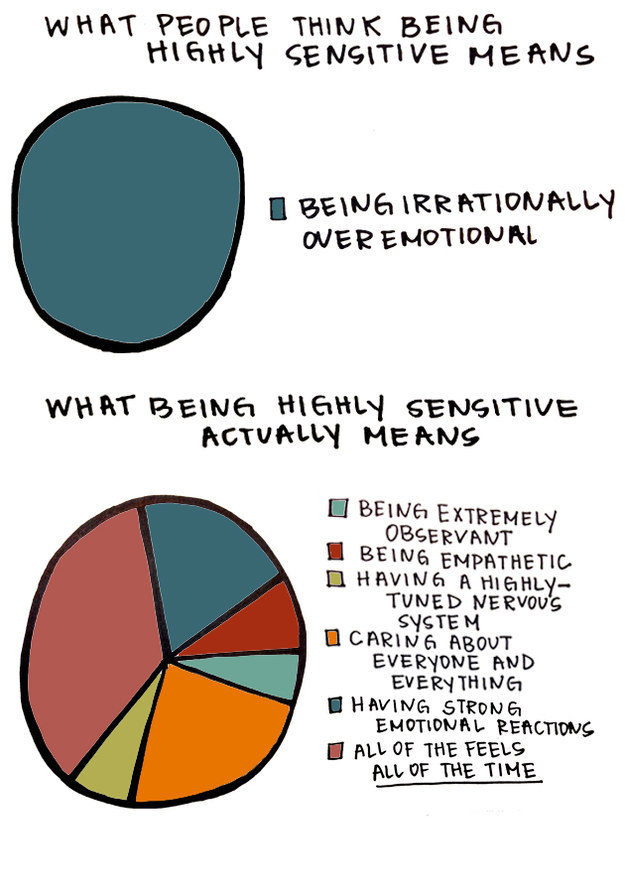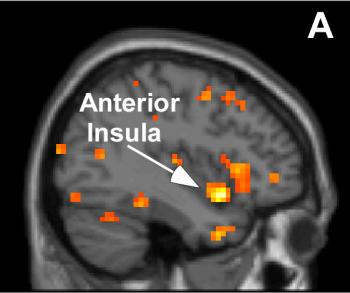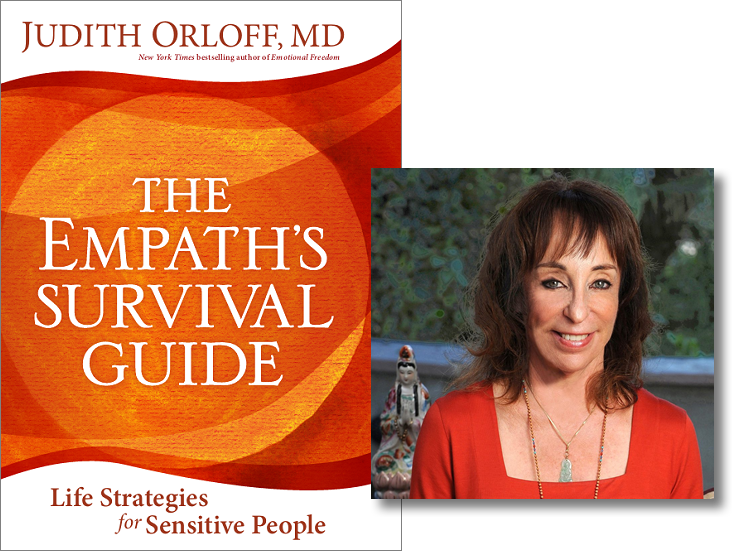Psychology Reflection Questions
- Do you experience more stress than the average person?
- Are you overly sensitive to external stimuli?
Chances are, there is nothing wrong with you or your coping strategies.
Instead, your brain may be more sensitive to stress than the average person.
You may in fact, be what Dr. Elaine Aron has coined “A Highly Sensitive Person” (HSP).

Research Shows Neurological Differences in Highly Sensitive People
Brain scans show that HSP’s have “heightened activity in empathy-related brain regions” including the anterior insula (insular cortex), highlighted in the brain scan below.

The intensified response of highly sensitive people (HSP) to stress is not a choice – it’s biological. HSP brains are wired differently than the average person. This fact has been clearly supported by scientific research.
Self Test: Are You Highly Sensitive?
- Are you easily overwhelmed by such things as bright lights, strong smells, coarse fabrics, or sirens nearby?
- Do you get rattled when you have a lot to do in a short amount of time?
- Do you make a point of avoiding violent movies and TV shows?
- Do you need to withdraw during busy days, into bed or a darkened room or some other place where you can have privacy and relief from the situation?
- Do you make it a high priority to arrange your life to avoid upsetting or overwhelming situations?
- Do you notice or enjoy delicate or fine scents, tastes, sounds, or works of art?
- Do you have a rich and complex inner life?
- When you were a child, did your parents or teachers see you as sensitive or shy?
Challenges
The main challenges for most HSP’s include:
- accepting their heightened emotional sensitivity
- understand their unique emotional and neurological needs
- employing distinctive strategies for coping with stress and anxiety on a daily basis
Solutions
Education and community are vital when it comes to harnessing the strengths of HSPs.
- Education reduces the shame associated with being highly sensitive.
- Community underscores that HSPs are not alone in how they process sensory stimuli.
Being highly sensitive is more universal than most HSPs know.
Where to start?
HSP Resources Solutions
- Coping Strategies for the Highly Sensitive Person by Dr. Ted Zeff
- How to Thrive When the World Overwhelms You by Dr. Elaine Aron
- Highly Sensitive People in the Workplace by Janine Ramsey
- With Care, You and Your Sensitivity Will Flourish by Deborah Ward
- A Guide to the Highly Sensitive Person (HSP) by Dr. Judith Orloff
Takeaway
Celebrate Who You Are
One Size Does Not Fit All
Sensitivity is your superpower!




Thank you, Dr. Andrea, for writing this post. I have gone through your self-test on your blog and realized that most of the things hold true for me. I am a highly sensitive person since my childhood. I get hurt easily by other people sometimes and I am unable to control my emotions during certain situations. Dr. Andrea, can you please tell me how we can handle our emotions better and what care should highly sensitive people take while dealing with people and stressful situations?
Hello Saurabh,
Sometimes (most times) the only control we have is of ourselves.
In addition to the books and websites listed at the end of this blog post, you may find the video below helpful in taking the pressure off yourself.
Most of all, remember to B R E A T H E 💭☀️
I just happened upon this (older) post in your blog. It is the first time I have seen this addressed as something other than a negative attribute. The self test was really interesting to me as it fits my personality – except for the last one. Although I may have actually been more shy than I acted because it was expected to NOT be shy.
I had assumed the high sensitivity was a learned “behavior” from childhood family experiences. Especially the increased empathy and constant “tuning in” to those around me. What is especially fascinating is that the natural inclination I may have had to do the other things listed (in the test) was so actively discouraged as a young person, I (unconsciously?) resisted. Until my life situation changed and shifted and I got older. And now I gravitate to doing exactly what is listed in that test – feeling better all around. It makes a bit more sense now.
I am so happy that you found this post!
I’m 90% sure I am. The biggest problem I have for the questions is that my brain automatically says yes but if its this scenario I’m not. It’s a pain for all questions. The hardest one to quantify is the not liking violent movies or shows… I like violent movies or shows as fiction (I realized as a teenager “violent” shows eased some of my anger issues) or historical fiction (ie Titanic) I can handle but I can’t handle historical fact movies (ie Amistad) but I can watch documentaries.
I love that you took the time to do the HSP test! Self-awareness and insight into our own sensitivities and personalities can make life more bearable AND successful. Wishing you a day filled with peace & joy! xo
I have always been very sensitive and been told to be less so.. by multiple people.. gosh it’s nice to be told it’s okay to be that way now and to own it xo
Amen Christy! This is why you are such a great writer. You get people in a way that they often don’t get themselves. #HSP #Superpower 💃💥
That’s a nice blog. Gave me something to think about. I’m not sure if I fit the bill but a few aspects do strike a chord.
That’s the fantastic thing about reading. The more we read, the better our chances of self discovery. Maybe there is an explanation, a sound one, that explains me ☺️☺️☺️
Really interesting. I think this is me! I do get overwhelmed easily, have to hide away quite regularly so I don’t melt into a stressed puddle, cry very readily and have to ration my news intake as it really affects me badly. I usually just feel a bit inadequate, like I can’t cope well with things that others just seem to take in their stride. Now I know this is a thing, I am definitely going to be reading more about it. Thank you for the really helpful information 🙂
I always love hearing lightbulb moments from readers.
Your insights about HSP are right on! 🙌
Wonderful post and one I can fully relate to. I’ve always felt things deeply and grew up with the label “you’re to sensitive”. Now I embrace it.
Smiling as I read your comment Miriam. I too have always felt things deeply. Which can be a blessing & a curse in my profession. I can relate to people so quickly & so deeply. The challenge is to turn the link off. Almost impossible in my early years as a psychologist. Much easier now with maturity & experience. Boundaries in all forms, are life saving for HSPs. And incredibly empowering!
You’re so right and I can well imagine that you’ve learnt much through years of experience. I think we all do.
Answers: 1. tick 2. tick 3. tick 4. would be impossible to achieve 5. tick tick 6. tick 7. tick 8. tick. Thank you for this. I will read the resources you supplied.
Hope you find the HSP resources helpful!
Knowledge is power. 📚💥
Reblogged this on Matters for the heart and commented:
Hello for another week,
This post is a big one for me…
You see, I’ve been sitting on this knowledge for a few years and waited for the right time and platform to share something that changed my life.
I discovered I was a HSP, short for a Highly Sensitive person.
I learnt there was such a trait after I heard it on a podcast and I literally bawled…I know there are reservations about labels, and having worked in Supported Education in a secondary school, I certainly know about the often overuse of labels.
But in my experience, sometimes it was a helpful diagnosis for the student, and other times it was requested to remain hidden and not discussed.
So it was with this in mind that I have held back.
After finding a wonderful post about this very topic by a a Psychologist, school professor blogger by the name of Dr Andrea Dinardo…. I knew what my next reblog had to be…
So it is with much pleasure that I’m helping to spread this information shared here by lovely Dr Dinardo from her inspiring blog about Positive Psychology (not to be confused with Positive thinking) .
Our hope is for everyone who didn’t quite understand why they couldn’t just ‘fit in with the crowd’ for many reasons, who had been told to just ‘grow a thicker skin’, was made fun of for crying easily, over thinking everything… the list goes on, comes to accept there is nothing wrong with us. Dr Dinardo covers this topic beautifully below.
There are resource links in Dr Dinardo’s post, including that of Elaine Aron, who pioneered the research.
You will discover your sensitivity is a beautiful thing and something to be proud of, no longer wishing to hide it under the carpet for fear of ridicule. It’s in a way, like coming home to ourselves and feeling a new sense of belonging and purpose…
This just may be… your first step to that self-acceptance you have strived for throughout your life…
I’m with you in this HSP journey, and may just explain some of my musings in previous blog posts.
Wishing you well,
and I’d really welcome comments and thoughts if feel you have something to share about your experiences.
Much love,
Di
Thank you for sharing my HSP post with your readers Di!
You are very welcome Dr Dinardo. It was a pleasure to share the news and you had written about better than I could have hoped to do…
The message is being received well and timely.
Thank you for a lovely reply 💐🌟
This is so wonderful and so amazing to discover! It’s nice to be able to identify with this and gain some resources where I can begin to find clarity. Thank you!
My pleasure Lea! Hope you found the resources for HSPs in this post helpful.
Embracing it is essential!! We are very often made to feel weak, silly, overwhelming. But it is a gift, I truly believe. The world needs the sensitivity we bring. Thank you for this post!
Smiling so wide as I read your note Angela.
Your enthusiasm for HSP gifts is infectious!
Happy to share a smile. 💜
Hello Dr Dinardo,
Oh my… I was going to write a post about this on my blog but I just may reblog this in the coming weeks if that’s ok?
I discovered this about three years ago and cried (naturally!) when I learnt this was me. All those years of being made to feel less because I took things to heart, became upset easily and noticed nuances in people to name a few… I’m very happy to say that I’m proud now. Great to get the information out to help others. I have Elaine’s book too.
Thank you for this one,
Di 💐
You are so welcome Di!
Thank you for the feedback. Knowing this information helped, makes the time to research & write the post worthwhile.
And of course, I would love for you to reblog & share with your readers! The more this information helps, the better.
This post also dovetails on my earlier post “Who are you?” https://drandreadinardo.com/2017/04/24/who-are-you/ Encouraging all of us to own who we are without apology.
Sensitivity is a magical trait. Cherish it, as I do. xo
Oh thank you Dr. I most proudly will share it in another coupe of blog posts time. I’ll make mention of your ‘who are you post’ too.
Yes, it certainly made a big difference to me firstly as far as the comparing to others is concerned…That’s been the biggie for me….still working on it but getting better.
Thank you again for your beautiful reply, and yes, it is magical to be sensitive 💕
Thank you for this post, I’m an HSP as well and once I accepted that and stopped trying to ” build” a thicker skin, life became so much easier
Good for you Lorena! Awareness & Acceptance of HSP are a powerful combination. Only then can you take it to the next step –> Sharing your unique perspective with the world unveiled. Shine on Lorena!
Thanks for posting this!
I hope more HSPs will be aware of their superpowers. 😀
Amen Nicolle! 🙂
Im HSP it took me years to fully learn to live with it and fully embrace it 😊
How wonderful that you finally embrace being an HSP.
A work in progress (and a steep learning curve) for sure.
Yep, I’m grateful to be an empath…guess it makes me struggle with those who aren’t, and I wish I could open their hearts somehow to what moves me, but then we would all be the same! And that would be boring
Unique is a beautiful thing.🍀
Reblogged this on soulgifts – Telling Tales.
Thank you for sharing with your readers!
My pleasure. It was very well received.
HS people are often labelled as histrionic or over-anxious. This in turn can lead to their opinions, views, beliefs being belittled, dismissed or disregarded. Leading to further distress. A vicious cycle. Your article puts it into perspective. Thank you 🙂
I so appreciate your feedback & insights.
Having research to back up HSP traits demonstrates the legitimacy of the it. And gives HSP’s concrete evidence (for themselves & others) that being who they are is not a choice (or a mental health or a personality disorder) — it’s how their brain processes external stimuli.
Similar to the distinction between introverts & extroverts in their differing cortical arousal. As discussed in this Psychology Today article on biology, personality, and self-acceptance: https://www.psychologytoday.com/articles/201009/revenge-the-introvert
Thank you for the link, Andrea. Appreciate it 🙂
Brilliant post. I know I am HSP. Always have been.. but I hide some off what i feel may be seen as irrational.
Big hug HSP superpower! You feel what you feel. You think what you think. You are who you are. No apology needed. xo
I’m an empath/HSP. I feel other people’s emotions. Learned how to center myself/breathe to let go of what I sense from them. Nice!
Brilliant strategy for releasing others emotions & sensations. Simple yet so effective. Thank you for sharing. I know it will inspire other HSPs to do the same. Namaste. xo